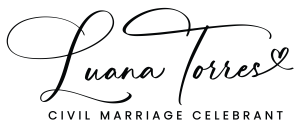Photo by Moana Ambrozi Photography
The Process
1. PRE-WEDDING PLANNING
- Initial enquiry – Get in touch with me with your preferred date, location, number of guests and language needs, and I will send you all the information you need about booking my services as a Marriage Celebrant. We can catch up over zoom or by phone if you have any questions.
- Booking – Once you are happy to book my services, I will send you a form to fill out and return to me with the necessary documents.
- Booking fee – A non-refundable booking fee is payable, which is deducted from the total fee. The balance is due 2 weeks prior to the wedding.
- Contact – We will remain in contact by email, text or whatsapp throughout the whole process.
2. PAPERWORK
The next step is the preparation and completion of all of the necessary legal documents as well as a run sheet outlining the order of the ceremony, what you are required to say, and other important details.
3. MEETING
Once the paperwork is ready, we organise a meeting in person or by zoom, during which we cover the following:
- Information – I take you through the steps of getting legally married in Australia and explain a number of important legal aspects of marriage, including the documentation involved, registration of the marriage, and relationship services.
- Sight and check eligibility documentation – I need to sight your original identification documents, and any divorce order / death certificates.
- Sign and lodge the Notice of Intended Marriage (NOIM) – This is the document you need to sign at least one month before the wedding can legally take place. This can also be signed before another authorised witness.
- Discuss ceremony – This is when we have an extensive chat about ideas for your ceremony and go through the draft run sheet.
- Resources – Depending on your requirements, I can also provide you with ideas and examples of symbolic or cultural wedding traditions, rituals and readings, and I can also provide resources and assist with your vows.
4. PREPARATION
- Ceremony – Once the legal documents are taken care of, I will prepare a personalised ceremony, which reflects your ideas, personalities and style, unless it is a basic ceremony.
- Bilingual ceremonies – If the ceremony is bilingual, I will translate the ceremony so it doesn’t lose meaning. I can also assist with translations of readings, vows and speeches if required.
- Confirmation for legal purposes – If one party is overseas (or if this otherwise required), I can assist with the preparation of a letter to the Department of Home Affairs to confirm a Notice of Intended Marriage has been lodged with me and the ceremony booked, in order to facilitate the visa application.
5. FINAL CATCH UP
- Final details – The purpose of this meeting, which is usually done via zoom, is to go through the final run sheet and ensure every aspect of the ceremony has been covered and everyone is on the same page. Any final changes are made at this point.
- Rehearsal – Whilst a rehearsal is optional and will incur an extra fee, I encourage my couples to organise a few hours close to your special day to run through the ceremony, even if it’s just at home. This will help you (and your wedding party) gain an insight on proceedings for the day.
- Declaration – Before the ceremony you will also need to sign a ‘Declaration of No Legal Impediment’. This is a document which confirms you are still free to marry.
6. YOUR BIG DAY
- Ceremony – The dream becomes real and your personalised ceremony comes to life. We have completed our checklist and are ready to go.
- Equipment – I bring my own professional P.A. system with wireless microphones, and I can assist with coordination of music if required. I arrive about an hour before the ceremony, to set-up and test my equipment.
- Other suppliers – I can assist with coordinating entrances, exit, and liaising with suppliers, including photographers, videographers and musicians, to ensure it all goes smoothly.
- Marriage Certificates – At the end of the ceremony, the couple, witnesses and Marriage Celebrant sign the official certificates, and after any necessary announcements, you and your guests can enjoy the rest of the day’s celebrations.
7. POST-WEDDING
- Lodgement of paperwork – After the ceremony I lodge the necessary paperwork with the Registry of Births, Deaths and Marriages in order to register the marriage. I also make an application for the official Marriage Certificate, which I later send to you along with a certified copy.
- Change of name – I can also assist you with changing your name, depending on your requirements.
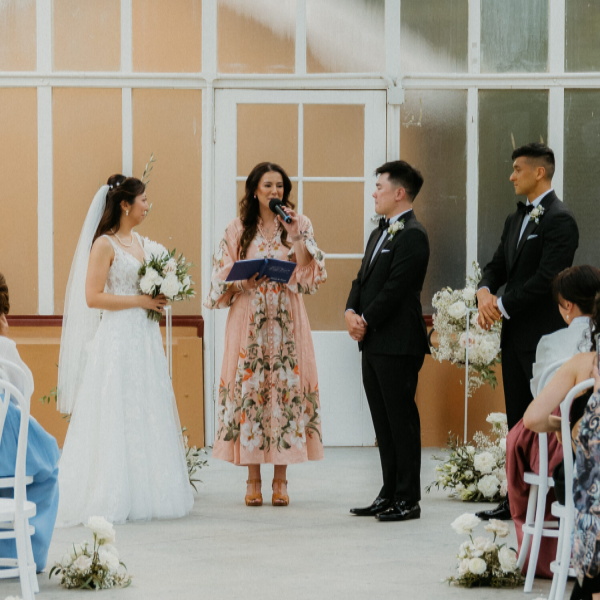
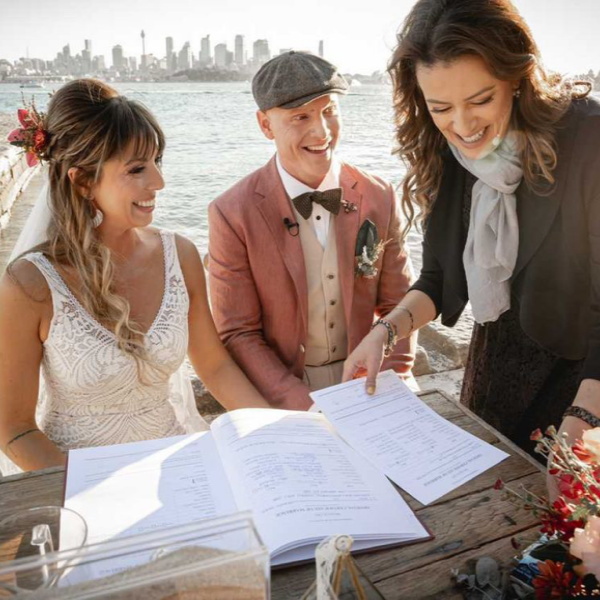
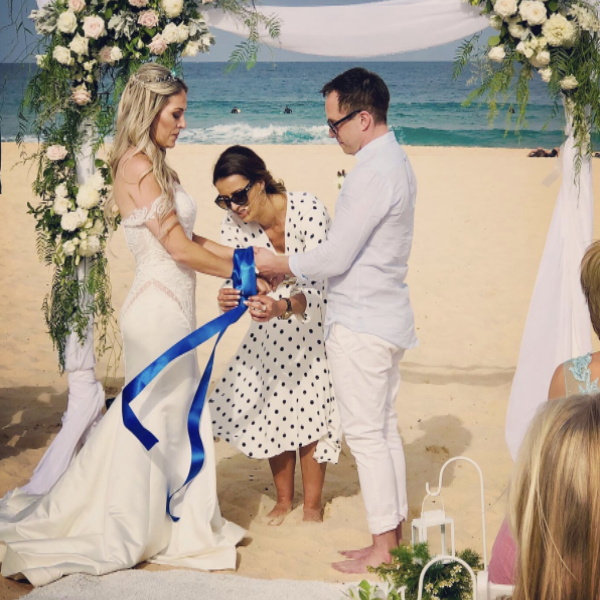
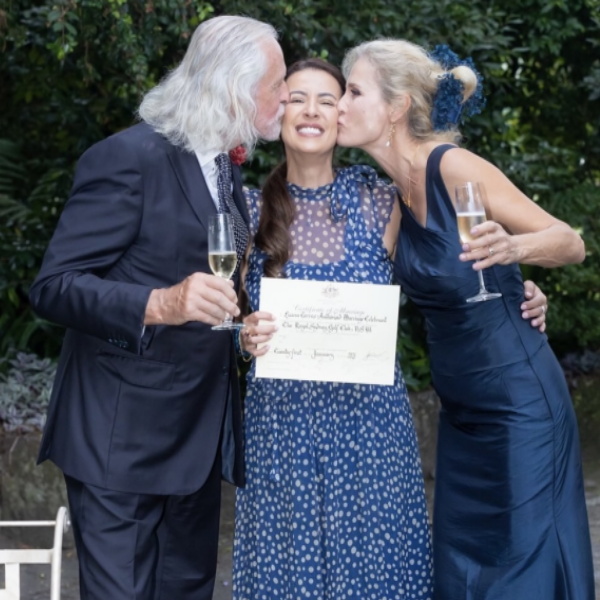
Photo by Nick Kofiotis Photography
FREQUENTLY ASKED QUESTIONS
1. What is a ‘Notice of Intended Marriage’ (NOIM)?
A Notice of Intended Marriage (also known as ‘NOIM’ or ‘NIM’) is a legal document completed by both parties to the marriage with the Marriage Celebrant. It must be signed and witnessed by the Celebrant, or another authorised witness. Once completed, signed, witnessed and sent to the Celebrant, this officially lodges your intention to marry in Australia.
2. When do I have to lodge my NOIM and for how long is it valid for?
You must lodge your NOIM with the Celebrant at least one month before your wedding date.
Your NOIM is current for 18 months from the date of lodgement.
3. What identity documents do I need in order to marry in Australia?
A copy of your passport is sufficient, but it may also be a good idea to provide your Celebrant with a copy of your driver’s licence or NSW ID. If you are divorced or widowed, you will need to produce a divorce order / death certificate.
4. Do I have to have a wedding ceremony?
In order to be married according to law in Australia (Marriage Act 1961), you must make certain vows to each other and the Celebrant is required to make certain statements to the couple and their witnesses.
5. Do I need a witness?
Yes.
You need to have two witnesses at the ceremony who are over the age of 18 and are able to understand the purpose (and language) of the ceremony.
6. How long does the ceremony take?
The length of the ceremony depends on what the couple wishes to include, and whether it is a bilingual ceremony. Generally, marriage ceremonies take about 30-45 minutes, unless it is a basic or ‘legals-only’ ceremony, in which case it can take about 15-20 minutes, or less.
7. Can we write our own vows?
Absolutely, as long as you include the legally required wording. I will take you through the ceremony step by step and give you all the assistance you need, including regarding your vows.
8. What about legal aspects such as registration?
Once your marriage is solemnised, I will lodge all of the required documents with the relevant Registry of Births, Deaths and Marriages in order for your marriage to be legally registered.
At this time I will also apply for the official Marriage Certificate on your behalf, which I will send to you, along with a certified copy.
9. What do I receive on the day?
You will receive a commemorative Certificate of Marriage, which in most instances will be beautifully hand calligraphed, a copy of your vows, any other materials used during the ceremony and a little gift from me.
Although your Certificate of Marriage is a legal document, it is not widely accepted as a form of identification, so I will also apply for a registered Marriage Certificate from the Registry of Births, Deaths & Marriages.
10. How much does your services as a Celebrant cost?
My fee depends on the type of ceremony you want, the size of the wedding, whether it’s bilingual, any inclusions, and how far I will need to travel. I will provide you with an estimate when I have this information.
11. Do I have to change my name? What do I need to do if I choose to take my partner’s last name?
No, you do not have to change your name.
If you decide to change your surname after marriage in Australia, it’s not necessary to pay the fee for an official change of name. Most government departments accept your official marriage certificate, or a certified copy, as proof of your name.
Once you update your NSW Driver Licence and Medicare card, you can usually change your name everywhere else.
The surname options after marriage can be as follows –
- you can take your partner’s surname;
- your partner can take your surname;
- you can combine your name and your partner’s name with a hyphen.
For any other change of name, or if you need to register your marriage and name change overseas, you need to apply for an official ‘change of name’. I can assist with this if required.
https://www.nsw.gov.au/family-and-relationships/name-changes-and-corrections/change-of-name
12. Do I have to be an Australian citizen to be married in Australia?
No, anyone can be married in Australia, irrespective of nationality, residency or citizenship status.
13. Will my marriage be valid overseas?
Whilst Australia accepts most foreign marriages as legally valid, the opposite is not always the case.
If you are a citizen of a country other than Australia, you need to check whether your Australian marriage is automatically valid in that country. It is advisable that you check with your Consulate/Embassy, whether your Australian marriage needs to be ‘registered’ in that country. This may involve the ‘legalisation’ of your Australian Marriage Certificate and the official Change of Name certificate.
14. What do you on the day and do you bring your own equipment?
As your Marriage Celebrant, my role on the day is to conduct your marriage ceremony as well as oversee everything that impacts directly on your ceremony. I work with your suppliers, including wedding planner, photographer, videographer, musicians, and venue staff, to ensure the ceremony goes smoothly and we are all on the same page.
Yes, I bring my own professional P.A. system with wireless microphones.
I arrive earlier to set-up and test my equipment, and to liaise with all of those involved in the ceremony.
I also need to see each party to the marriage individually before the ceremony, to further establish consent to the marriage.
15. What is your best advice for couples planning their wedding ceremony?
Let your wedding day be real. Be present in the moment and enjoy the day.
Your wedding ceremony should be full of laughs, raw emotion and good vibes.
Book your vendors, especially your Marriage Celebrant, venue, and photographer as early as possible, and spend the time opening up to your Marriage Celebrant and trusting them to make your ceremony into something amazing.
Keep in touch with your Marriage Celebrant and ensure you have provided all of the documents and information requested in a timely manner.
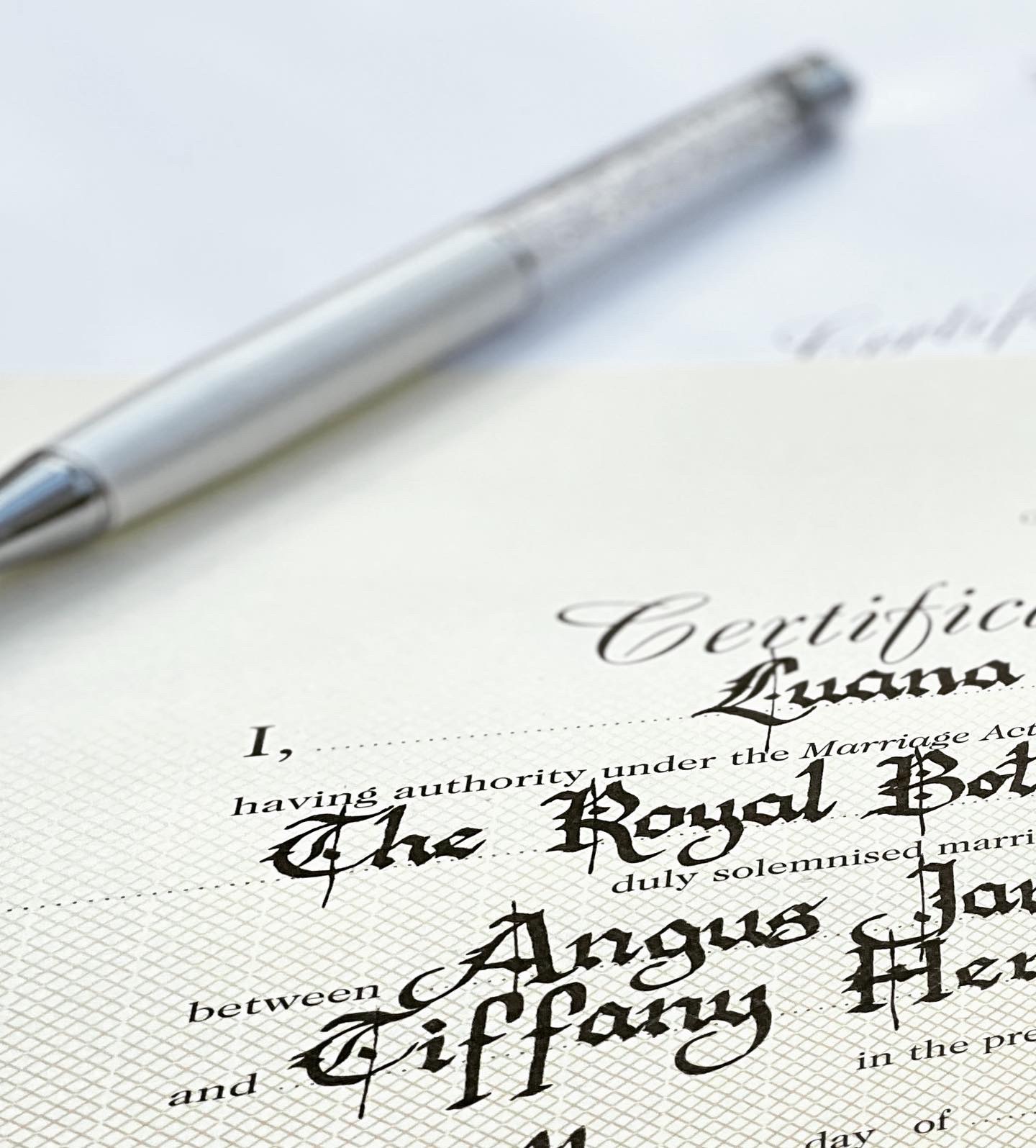
Photo by The Nook Weddings
